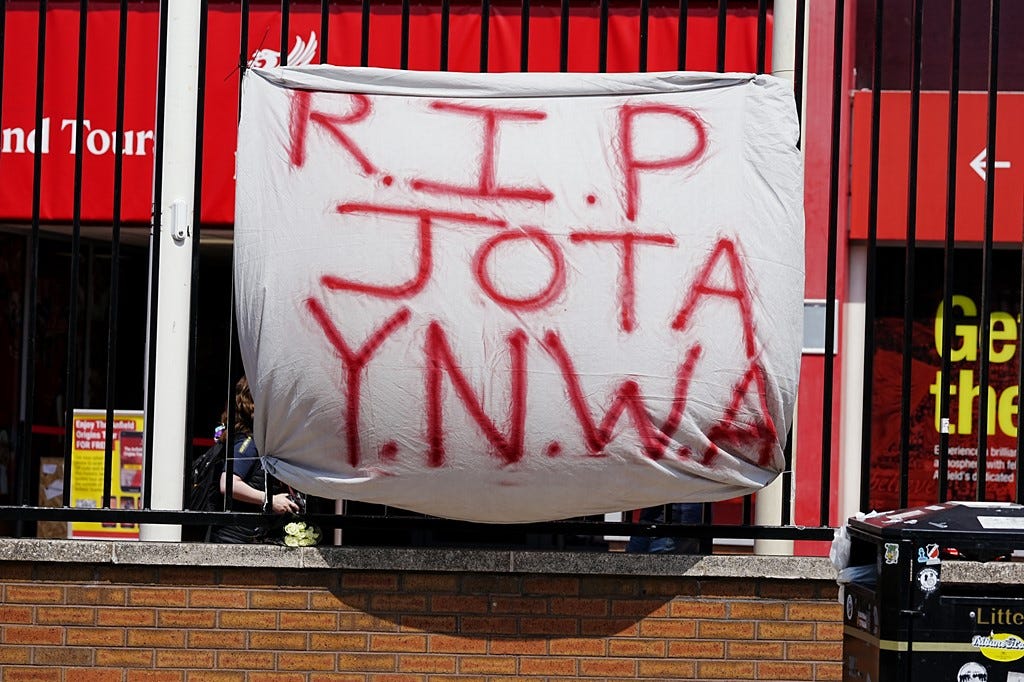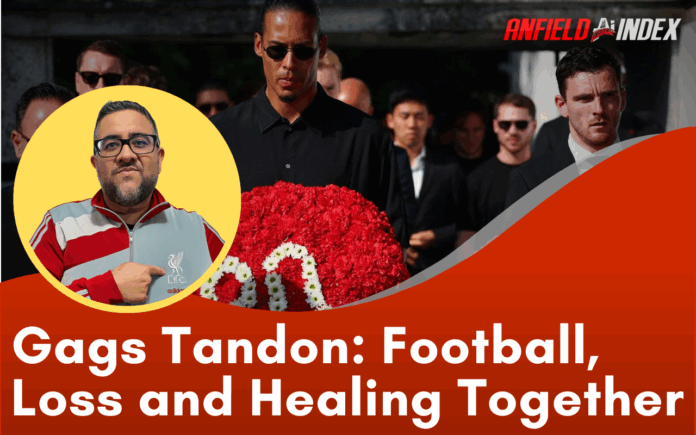Jota’s death has reminded us how fragile we all are
There’s something about this one that hit different. Maybe it’s because Diogo Jota was one of ours. Maybe it’s because he had just started the next chapter of his life. Maybe it’s because he died alongside his brother. Maybe it’s all of that. Or maybe it’s because grief, when it returns, doesn’t ask permission.
In the past few days, I’ve heard from Reds around the world who’ve admitted something deeply personal. The news of Jota’s death didn’t just sadden them. It re-opened wounds they thought had long healed. People told me they were confused by the depth of their emotions, some even said they felt guilty for feeling so overwhelmed by the passing of someone they’d never met. But this is what grief does. It doesn’t play by any rulebook. It takes whatever shape it wants, whenever it wants.
If that’s been you this week, please hear me when I say this: you are not selfish. You are not overreacting. You are grieving. And that is entirely human.
Grief Wears Many Shirts
Football has always been a place where grief and glory meet in strange, complicated ways. We cry over titles lost and celebrate with tears when they are won. But this week, it wasn’t a trophy that got away or a rival pipping us at the post. It was something real, raw, permanent.
Seeing Jota’s Liverpool teammates walking into that church in Gondomar, heads bowed, hands full of floral tributes, was enough to take the breath away. Virgil van Dijk, Andy Robertson and the rest looked like they were lining up for a Champions League final, only this time the opponent was loss itself.
Outside the church, hundreds of fans stood quietly, unable to find words, but somehow finding each other. “Força,” someone shouted to the players. Strength. That’s what it takes. Not to keep playing football, but to keep living.
Grief isn’t a moment. It’s not a week. It becomes part of you, a quiet echo in the background of your life. It might sit still for months, even years. Then something triggers it. A song, a photograph, a headline. And suddenly you’re crying in your car on a Tuesday afternoon, wondering how the hell we got here again.
Mental Health and Football: Breaking The Silence
We talk a lot about football being a community. And it is. But community means more than just sharing wins. It means showing up for each other when the game stops and the world goes silent. The news about Diogo didn’t just break hearts; it triggered deeper pain in many people. For some, it was like their own past came charging back through a crack in the wall.
That’s not weakness. That’s the way trauma works. It’s not a wound you can stitch shut and forget about. It’s something you carry, something you adapt to. You don’t beat grief. You walk with it. You learn how to live around it.
So if you’ve felt numb, or confused, or angry, or even guilty this week, let me tell you what I’ve told others: you are not broken. You’re processing something complex. You’re revisiting something you never fully left behind. And that’s not just okay, it’s necessary.
I’ve tried to be there for others this week, the same way people have been there for me. I’m a mental health first aider. That’s a qualification, sure, but more than that, it’s a promise. If you need someone to talk to, I’m here. We all should be. Because you never know what someone else is carrying.

YNWA Means More
You’ll Never Walk Alone. Four words that have always held meaning for us, but rarely have they felt more alive than now. Not as a slogan or a chant, but as a way of living.
I’ve always said that hearing it sung at Anfield gives me a lump in my throat. On the big days, in the big games, I sometimes cry when it rings out across the ground. It’s not just the song, it’s what it represents. Unity. Memory. Hope. And this week, it reminded us of something else. That our club, our fanbase, is built on empathy. We care, we feel, we show up.
Over the past few days, I’ve felt that care in ways I never expected. Messages from people checking in. DMs from strangers. Little acts of kindness that meant the world. I’m trying to return the favour now, to pass it on. Because if this loss has taught us anything, it’s that connection is everything.
In Gondomar, the shirts worn by fans came from different clubs and different cities, but the pain was shared. You didn’t need to know Jota personally to feel like something had been taken from you. You only needed to have cheered his name once, sung his song, and watched him work his magic.
His life ended far too soon, but his legacy will echo far beyond his years.
We Remember, We Heal, We Carry On
Someone at the funeral held a sign that read “Para sempre um de nós.” Forever one of us. And that’s exactly what Diogo is now. He is part of Liverpool’s story, not just because of the goals, the trophies, the moments, but because of how he made us feel.
We’ve all got a Jota moment etched into memory. For some, it’s that baby shark celebration at Goodison. For others, it’s his quiet ruthlessness, always the one to seal a 3-1 win. Maybe it was his ability to come off the bench and change a game. Or maybe, like me, it’s something more intangible. That sense of inevitability. That belief that with Jota on the pitch, something could always happen.
And yet, now, we’ve been reminded that life itself is the most fragile of all moments. That grief, like football, doesn’t always offer a fair result. But in this cruel ending, we’ve also been reminded of our strength. Of our resilience. Of our shared humanity.
So take care of each other. Reach out. Ask twice. Be gentle with yourself. We will all carry Jota with us, in our own way. And we’ll carry each other too.
Because You’ll Never Walk Alone isn’t just a thing we say.
It’s a thing we live.



